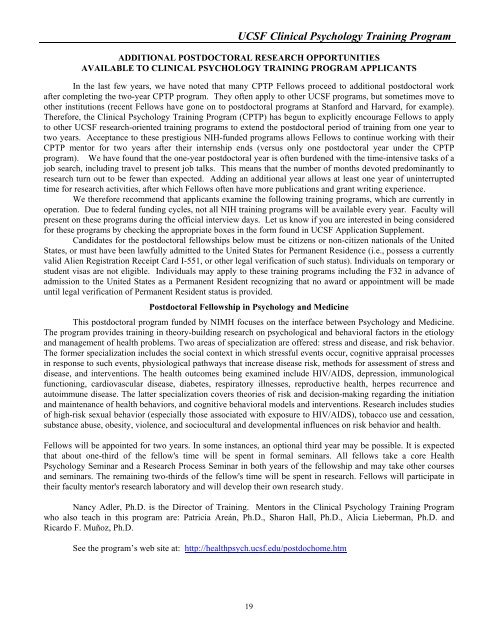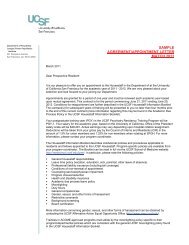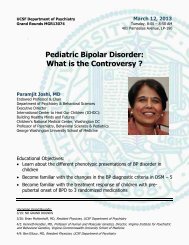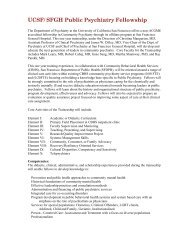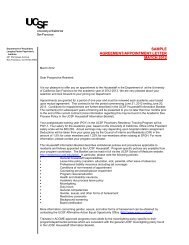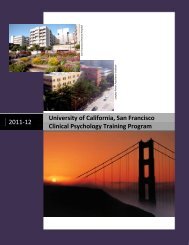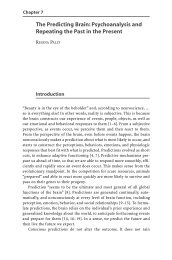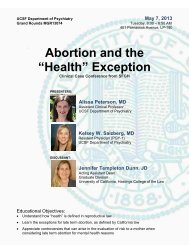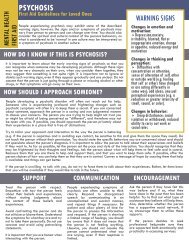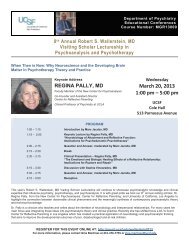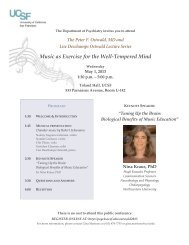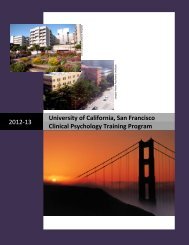Clinical Psychology Training Program - UCSF Department of ...
Clinical Psychology Training Program - UCSF Department of ...
Clinical Psychology Training Program - UCSF Department of ...
Create successful ePaper yourself
Turn your PDF publications into a flip-book with our unique Google optimized e-Paper software.
<strong>UCSF</strong> <strong>Clinical</strong> <strong>Psychology</strong> <strong>Training</strong> <strong>Program</strong><br />
ADDITIONAL POSTDOCTORAL RESEARCH OPPORTUNITIES<br />
AVAILABLE TO CLINICAL PSYCHOLOGY TRAINING PROGRAM APPLICANTS<br />
In the last few years, we have noted that many CPTP Fellows proceed to additional postdoctoral work<br />
after completing the two-year CPTP program. They <strong>of</strong>ten apply to other <strong>UCSF</strong> programs, but sometimes move to<br />
other institutions (recent Fellows have gone on to postdoctoral programs at Stanford and Harvard, for example).<br />
Therefore, the <strong>Clinical</strong> <strong>Psychology</strong> <strong>Training</strong> <strong>Program</strong> (CPTP) has begun to explicitly encourage Fellows to apply<br />
to other <strong>UCSF</strong> research-oriented training programs to extend the postdoctoral period <strong>of</strong> training from one year to<br />
two years. Acceptance to these prestigious NIH-funded programs allows Fellows to continue working with their<br />
CPTP mentor for two years after their internship ends (versus only one postdoctoral year under the CPTP<br />
program). We have found that the one-year postdoctoral year is <strong>of</strong>ten burdened with the time-intensive tasks <strong>of</strong> a<br />
job search, including travel to present job talks. This means that the number <strong>of</strong> months devoted predominantly to<br />
research turn out to be fewer than expected. Adding an additional year allows at least one year <strong>of</strong> uninterrupted<br />
time for research activities, after which Fellows <strong>of</strong>ten have more publications and grant writing experience.<br />
We therefore recommend that applicants examine the following training programs, which are currently in<br />
operation. Due to federal funding cycles, not all NIH training programs will be available every year. Faculty will<br />
present on these programs during the <strong>of</strong>ficial interview days. Let us know if you are interested in being considered<br />
for these programs by checking the appropriate boxes in the form found in <strong>UCSF</strong> Application Supplement.<br />
Candidates for the postdoctoral fellowships below must be citizens or non-citizen nationals <strong>of</strong> the United<br />
States, or must have been lawfully admitted to the United States for Permanent Residence (i.e., possess a currently<br />
valid Alien Registration Receipt Card I-551, or other legal verification <strong>of</strong> such status). Individuals on temporary or<br />
student visas are not eligible. Individuals may apply to these training programs including the F32 in advance <strong>of</strong><br />
admission to the United States as a Permanent Resident recognizing that no award or appointment will be made<br />
until legal verification <strong>of</strong> Permanent Resident status is provided.<br />
Postdoctoral Fellowship in <strong>Psychology</strong> and Medicine<br />
This postdoctoral program funded by NIMH focuses on the interface between <strong>Psychology</strong> and Medicine.<br />
The program provides training in theory-building research on psychological and behavioral factors in the etiology<br />
and management <strong>of</strong> health problems. Two areas <strong>of</strong> specialization are <strong>of</strong>fered: stress and disease, and risk behavior.<br />
The former specialization includes the social context in which stressful events occur, cognitive appraisal processes<br />
in response to such events, physiological pathways that increase disease risk, methods for assessment <strong>of</strong> stress and<br />
disease, and interventions. The health outcomes being examined include HIV/AIDS, depression, immunological<br />
functioning, cardiovascular disease, diabetes, respiratory illnesses, reproductive health, herpes recurrence and<br />
autoimmune disease. The latter specialization covers theories <strong>of</strong> risk and decision-making regarding the initiation<br />
and maintenance <strong>of</strong> health behaviors, and cognitive behavioral models and interventions. Research includes studies<br />
<strong>of</strong> high-risk sexual behavior (especially those associated with exposure to HIV/AIDS), tobacco use and cessation,<br />
substance abuse, obesity, violence, and sociocultural and developmental influences on risk behavior and health.<br />
Fellows will be appointed for two years. In some instances, an optional third year may be possible. It is expected<br />
that about one-third <strong>of</strong> the fellow's time will be spent in formal seminars. All fellows take a core Health<br />
<strong>Psychology</strong> Seminar and a Research Process Seminar in both years <strong>of</strong> the fellowship and may take other courses<br />
and seminars. The remaining two-thirds <strong>of</strong> the fellow's time will be spent in research. Fellows will participate in<br />
their faculty mentor's research laboratory and will develop their own research study.<br />
Nancy Adler, Ph.D. is the Director <strong>of</strong> <strong>Training</strong>. Mentors in the <strong>Clinical</strong> <strong>Psychology</strong> <strong>Training</strong> <strong>Program</strong><br />
who also teach in this program are: Patricia Areán, Ph.D., Sharon Hall, Ph.D., Alicia Lieberman, Ph.D. and<br />
Ricardo F. Muñoz, Ph.D.<br />
See the program’s web site at: http://healthpsych.ucsf.edu/postdochome.htm<br />
19


